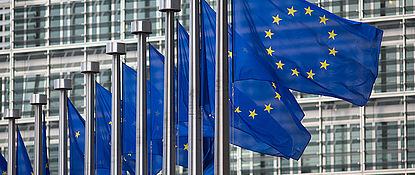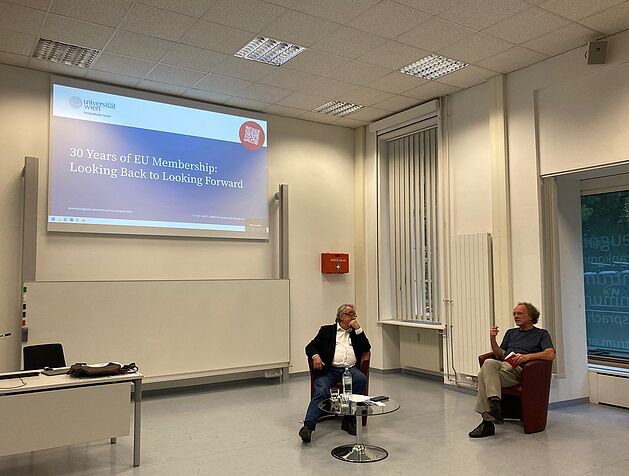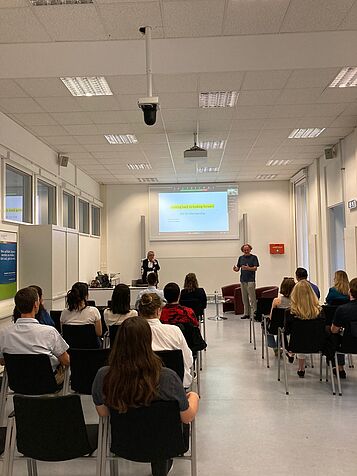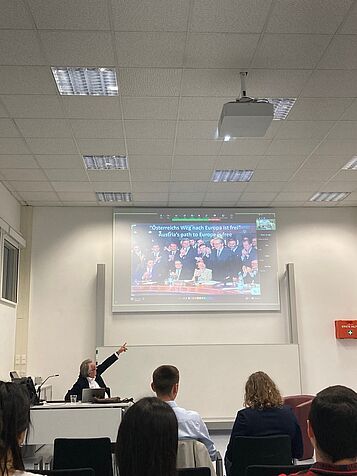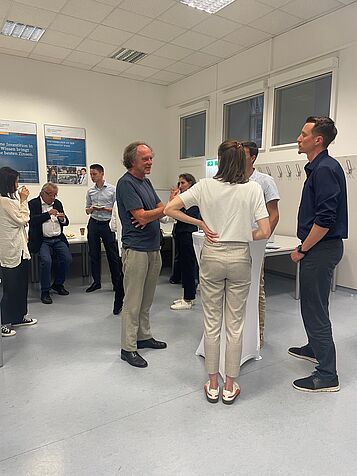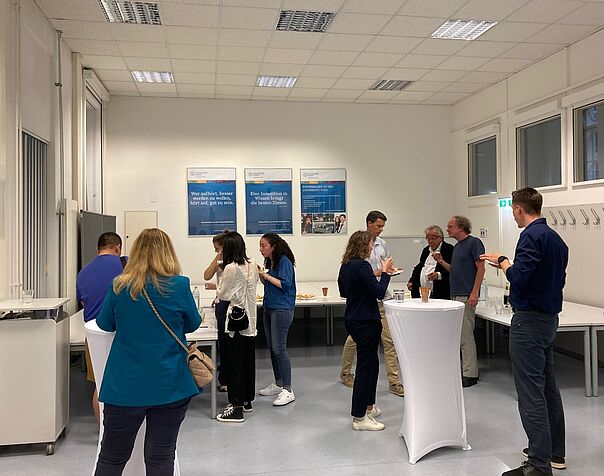Insights into the program
You can find some current insights into the master's program "European Studies" here below.
Lecturers
You can find information about the lecturers of the master's program here.
The Unfinished European Project
In light of Austria's 30th anniversary in the EU, Prof. Christoph Reinprecht reflects on the nation's past and present within the Union and highlights the master's program "European Studies" as a key to understanding and advancing the European project.
Read the full article here.
Panel Discussion: “30 Years of EU Membership: Looking Back to Looking Forward”
To mark the 30th anniversary of Austria’s accession to the European Union, we welcomed former Austrian diplomat Mag. Michael Reinprecht and academic director of the master’s program “European Studies” Prof. Christoph Reinprecht on June 2nd, 2025, for an engaging evening reflecting on Austria's path to EU membership.
Michael Reinprecht, who served as the diplomatic press officer during Austria’s EU accession negotiations in the early 1990s, offered first-hand insights into this historic process. From Austria’s diplomatic isolation following the Waldheim affair in 1986 to the official application for EU membership in July 1989, submitted 112 days before the fall of the Berlin Wall and a shift in the European political landscape - the road to Brussels was not straightforward. But it was an exciting time to work toward the goal of joining the European Economic Community.
The new Austrian government at the time, the Grand Coalition, showed internal unity in its push for integration and bringing Austria into the European Community.
The audience gained insight into the 29 negotiation chapters and the complex final issues that had to be resolved, including agriculture, transit and environmental standards.
“No sleep, lots of pizza, coffee, and cigarettes,” as Michael Reinprecht recalled, describing the final days of the negotiation marathon. It culminated on February 28, 1994, at 23:59, when the mechanical clock at the press center was literally stopped to mark the moment of agreement. The negotiations concluded with emotion, applause, and relief.
During the Q&A, the challenges the EU faces today were explored. Reflections focused on the complexity of enlargement processes, noting how today's geopolitical context differs from the optimism of the early 1990s. The discussion touched on topics such as the growing divisions within European societies, the limits of EU efficiency due to national interests, Austria’s neutrality and the role of media.
The evening concluded with personal anecdotes offering a behind-the-scenes look at that pivotal period.
Impressions from the evening
Dr. Ralph Janik on his new course in the master program
The following interview with international law expert and long-time university lecturer Dr. Ralph Janik, provides insights into the existing course "Legal Aspects of Globalisation of World Trade" as well as the new course "EU Legislation" introduced in the master program "European Studies". Through simulations of the EU legislative process, while taking on roles representing member states, the European Commission, and the Council, students will encounter issues that are on the agenda of the European Union from different perspectives. This course is designed to bridge the gap between theoretical knowledge and real-world practice, offering students insights into the practical implications of EU laws.
"European Studies" lecturer Dr Ralph Janik on his new course "EU Legislation"
Insight into the master program from scientific director Prof. Christoph Reinprecht
In this interview Prof. Reinprecht, the scientific director of the postgraduate program “European Studies”, emphasizes the significance of European Studies in understanding the challenges faced by Europe. He highlights the program's evolution since its start in 2000, adapting to changes in the global landscape. The program covers diverse pillars like political science, legal framework, and economic processes. Additionally, it incorporates cultural and historical perspectives to foster a comprehensive understanding of Europe and Europeanization. Here you can watch part I of the interview.
"European Studies" - Interview with scientific director Professor Christoph Reinprecht, Part I
The "European Studies" program, as explained by Professor Reinprecht in part II of the interview, is characterized by its interdisciplinary and international nature. All courses are conducted in English, bringing participants and faculty members from diverse disciplinary backgrounds together. The program is designed for those interested in European issues across various professional fields. It aims to develop a common language and understanding, reflecting the process of "doing Europe".
"European Studies" - Interview with scientific director Professor Christoph Reinprecht, Part II
Interview with scientific director Prof. Christoph Reinprecht
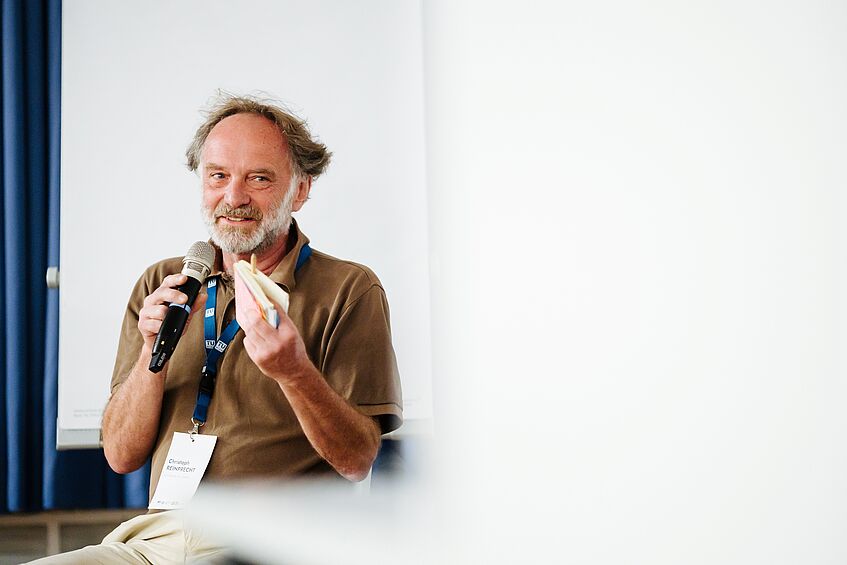
Interview with scientific director Prof. Christoph Reinprecht
The curriculum of the postgraduate program "European Studies" has been amended and updated and the next start of the master program will be in October 2023. We have asked the scientific director, Professor Christoph Reinprecht, for an interview about the new curriculum. You can read the interview here below.
The existing continuing education program "European Studies" of the University of Vienna was amended and updated. What are the main updates and alterations?
The European study program has been running for more than 20 years. During this time, not only the European Union itself, in its structure and its role in the world has changed; also the issues Europe is confronted with and the problems that need to be solved, on European and global levels, have changed significantly: global warming, migration, increasing unequal distribution of wealth, the returning of war and armed conflicts also on European territory amongst others. So, in that regard there are good reasons to adjust our curriculum. Next to the existing curriculum from before, there are now new courses e.g. on inequalities in Europe, communication in and about Europe or academic research and writing. Furthermore there is now, for example, a small simulation of the EU legislation process. At the same time, we adapted the program to the requirements of Austrian higher education law: the European Studies postgraduate program now offers a complete master's program with 120 ECTS. The program is now offered completely in English to make it more accessible. Courses are now held Thursday and Friday afternoons and evenings and Saturdays the whole day to better enable employed persons to join our program as well.
The postgraduate program "European Studies" exists for more than 20 years already. What were some of the highlights of the past years for you as the scientific director.
There have been many highlights in recent years. Strictly speaking, the composition of the students was a highlight every year: always different, always exciting, always incredibly enriching. Another special highlight every year are the excursions to Brussels where participants get to visit different European institutions and meet various experts to talk with them about their work.
Why is the master program still relevant 20+ years later?
There are many reasons that make the master program relevant: the world is more complex than ever, the European integration process still not accomplished, and the challenges for a democratic, peaceful and sustainable development seems to be greater than ever, to name a few important reasons to deepen and sharpen our understanding of Europe and its future, which the master program aims to do.
Who is the target group of the master program?
The master program addresses everybody interested in Europe and the European Union, its development and its future. If you are interested in and passionate about Europe and want to learn about Europe and EU Institutions from different academic perspectives, and or if you work or want to work in European or international organizations for example, the program offers an interdisciplinary curriculum to gain knowledge from different disciplines. The postgraduate program is for anyone who wants to receive a profound University education in the field of European Studies. We welcome participants from all parts of the world, all disciplinary backgrounds, independent from their professional status and life course situation.
What can participants expect from the (new) curriculum?
Participants gain a deep and differentiated knowledge and understanding of historic, economic, legal, political, and socio-cultural aspects of European integration. They are also trained in professional skills required when working in and with European institutions. Teaching is organised in Vienna University's inspiring intellectual environment. Most faculty members belong to the scientific staff of the University of Vienna. They are complemented by EU practitioners. Teaching in the master program is strongly interactive and interdisciplinary, and thrives on the participants' interests and commitment.

